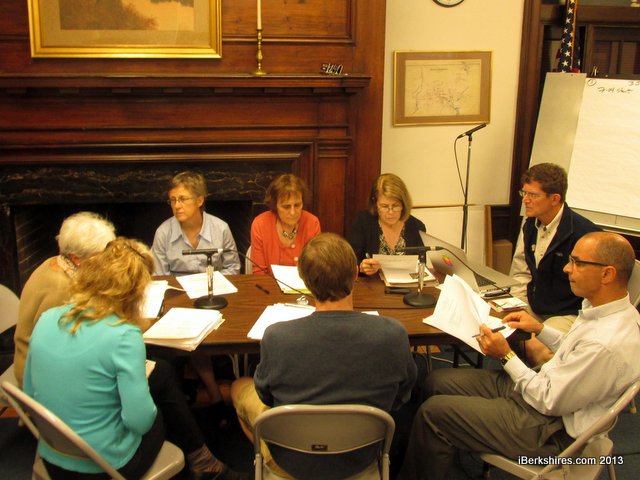Williamstown Panel Aims to Rule Spruces In Or Out
 The coordinating group for affordable housing and land use threw the Spruces back on to the table on Monday night. The coordinating group for affordable housing and land use threw the Spruces back on to the table on Monday night. |
WILLIAMSTOWN, Mass. — The committee charged with coordinating the town's affordable housing and land-use efforts is going to take another look at the possibility of preserving the Spruces Mobile Home Park.
But the goal will be to make a determination on the park's viability as quickly as possible.
Responding to concerns raised by several Spruces residents at last week's listening session, the Long-term Coordinating Committee decided at its Monday meeting that it would keep the Spruces "on the table" as a potential housing site if flooding problems can be alleviated.
The hitch is that the town already has signed on to accept the terms of a federal Flood Mitigation Grant that would require the park's closure.
Among other topics at its Monday meeting, the "super committee" comprising heads of various town boards speculated on whether it is too late to save the park now that the grant has been OK'd by the Selectmen.
"Once we receive the FEMA grant, the Spruces is off the table," Housing Authority Chairman Mark Reinhardt said.
"It might be the difference between accepting [the grant] and when we start spending it," noted Stan Parese, the chairman of the Board of Trustees of the town's Affordable Housing Trust.
The chairman of the town's Agricultural Commission said an evaluation of the Spruces would include the possibility of not accepting any part of the $6 million federal grant.
The potential problem there is that without the grant, the town's deal to acquire the park from owner Morgan Management is out the window, and the New York-based firm has said it cannot continue to operate the park given the number of home sites lost in the wake of 2011's Tropical Storm Irene.
"If we say no to FEMA, as I understand it, Morgan's intention is to close the park," Parese said. "What does it mean if FEMA is out of the picture and Morgan says, 'Here's your notice. We're closing the park' ?
"If Morgan is going to close the park, without the town's participation, the 65 people living out there are not going to be able to do the engineering work needed [to alleviate the flooding]."
And such engineering work — if possible — may not be allowable in a flood plain under state laws.
Planning Board Chairwoman Ann McCallum initially raised the issue of keeping the Spruces "on the list" of housing sites.
"There is a group in town who are perfectly educated and reasonable people who think it can be done," she said.
The chairman of the town's Conservation Commission immediately responded that what "can be done" is a matter of both physics and law.
"This would require Army Corps of Engineers intervention to allow all sorts of things that the local Conservation Commission could not allow under state law," Hank Art said.
Earlier this year in response to a request from a group of Spruces residents, the Selectmen asked the Corps if it could evaluate the park as a potential site for flood remediation. The Corps responded it could not take on a project that would benefit a single private entity — i.e. landowner Morgan Management.
But Stratton Road resident Kenneth Swiatek insisted at Monday's meeting that his private conversations with Corps officials indicate that the Corps would be willing to look at the site if it was owned by a tenants cooperative or even the town itself.
 John Broderick of the Bennington (Vt.) Regional Affordable Housing Corp.talks with committee as Chairwoman Jane Allen looks on. John Broderick of the Bennington (Vt.) Regional Affordable Housing Corp.talks with committee as Chairwoman Jane Allen looks on. |
Art offered to invite the Corps to meet with his Conservation Commission to discuss such a hypothetical.
Such a discussion likely would be welcomed by the "Save the Spruces" group and by Swiatek. He entered the public conversation last fall after he founded "Friends of Williamstown Conserved Land" with the goal of keeping the town from developing a town-owned parcel that abuts his home, but that group's first public meeting was dominated by Spruces residents angered by the prospect of closing the park.
Several members of the LTCC on Monday expressed fear that further discussion of preserving the Spruces could detract from town's efforts to find a site for suitable alternative housing.
"If it takes us six or nine months to do an analysis that we know at this instant what the outcome would be, the harm is we've used six or nine months," Art said.
"I don't think there's 'no cost' to [the analysis] because time is our scarcest resource, and this sounds like potentially a major time suck," Reinhardt said.
Selectwoman and LTCC Chairwoman Jane Allen said the town needs to move forward with the FEMA grant and stressed the importance of quickly resolving all questions about the Spruces' viability.
"We wouldn't want people to think we're disingenuous and just going through the motions to appease them," she said. "[But] I don't think we can hold up the submission for the grant to do this analysis. There are other communities out there that can use this grant."
In addition to discussing how best to meet the needs of Spruces residents who spoke to the committee last week, the LTCC used its Monday meeting to pick the brain of John Broderick, the executive director of Bennington, Vt.'s, Regional Affordable Housing Corp.
Broderick talked the committee through some of the considerations it would need to keep in mind when it works with a developer, like his RAHC, to create a subsidized housing project.
Broderick told the committee that while town officials (either the LTCC or the Affordable Housing Committee) can evaluate sites and compile a wish list of what they would like to see built, it is the developer who ultimately advises what is possible. And it is the developer who would work with funding agencies at the state and federal level.
Part of Broderick's message is not likely to sit well with many current Spruces residents. The consistent message at Friday's listening session — from residents for or against preserving the retirement park — was that they did not want to move into apartments.
"If it's senior housing, congregate housing is the way to go ... either an apartment building or a group, a cluster of homes, some level of density," Broderick said.
Broderick did not rule out entirely some sort of subsidized housing that includes giving residents their "own four walls." But he said the trend in the field is toward clusters that allow residents to access services that enable them to "age in place."
"To bring services to a place, it's better if you can have economies of scale," Broderick said. "It's expensive to have people go and visit [residents].
"It's more expensive to serve 25 people who live in the surrounding community than 50 who live in a single building."
Tags: affordable housing, coordinating committee, Spruces,















